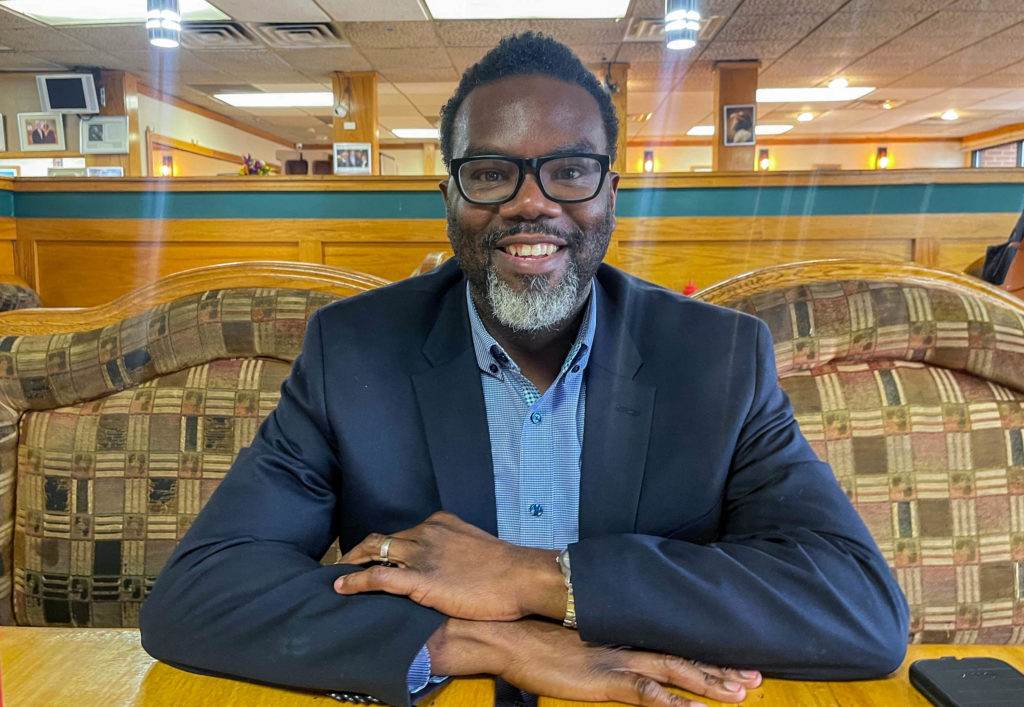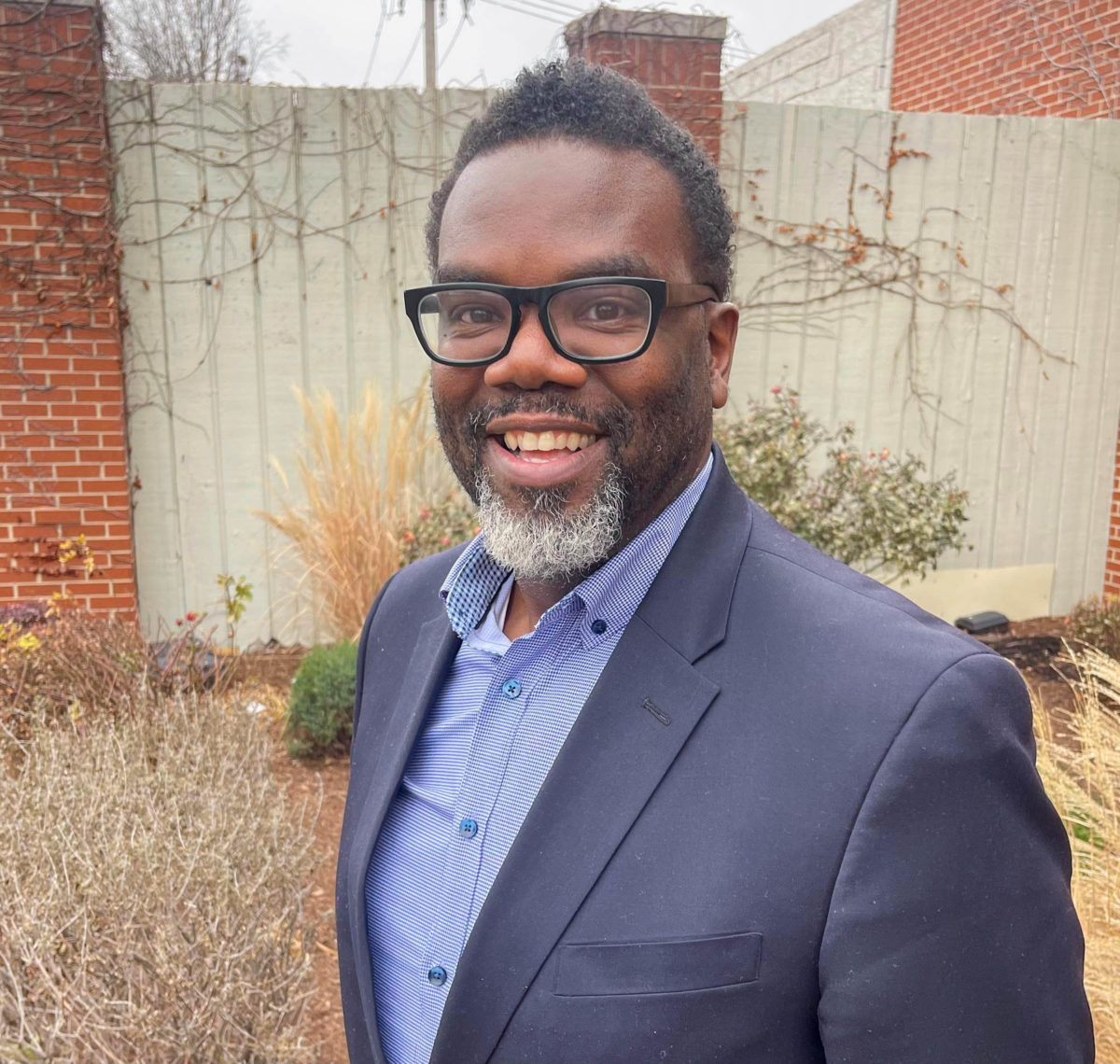The 2023 Chicago mayoral race is crowded with nearly a dozen candidates on the ballot, and Brandon Johnson is, thus far, considered by many to be the most progressive candidate for mayor of Chicago. The Weekly recently sat down with Johnson to understand his background and what he’s about.
Johnson has served four years as Cook County Board Commissioner in the 1st District, which includes part of Chicago’s West Side and a few western suburbs. He said he’s running because Mayor Lori Lightfoot has not looked out for working families, citing environmental justice, public education, and safety as areas where her administration has fallen short.
“She has flaked, and she has broken promises, and she has failed our communities in the most dramatic ways. And that is why I’m running for mayor of Chicago, quite frankly—to be a promise keeper,” he said.
Though Johnson largely grew up in Elgin, he shared that his paternal grandmother and their family, upon arriving in Chicago during the second wave of the Great Migration, made their first stop on the West Side and later settled on the South Side around 79th and Ashland.
He treasures memories of Sundays and holidays spent with cousins, aunts, and uncles in their South Side three-flat. Other relatives would continue their journey north to Saginaw, Flint, and Detroit, Michigan.
Along with his wife Stacie, Johnson is raising his children Owen, Ethan, and Braedyn in Austin. They attend Kenwood Academy and other Chicago Public Schools.
Johnson said the mayor’s lack of commitment has left communities like his feeling less safe. His neighborhood is hard-hit by violence, disinvestment, and overpolicing. He pointed out that too much money has been invested in incarceration instead of schools, libraries, parks, affordable housing, and mental health.
In his conversation with the Weekly, Johnson spoke about his late older brother and hero, Leon, who struggled with drug addiction.
“My brother died unhoused and addicted. And I wonder if we had a commitment thirty years ago to mental health and to treating individuals for their trauma and not criminalizing them….would he still be alive today?” he said. “It’s hard to talk about; I miss my brother dearly. And if we can prevent other families from experiencing what my family has gone through, I’m gonna do that.”
As Cook County Commissioner, Johnson worked on the Budget for Black Lives, an effort to divert money away from Cook County jails and invest more in addressing the root causes of violence. He listed several initiatives that resulted from this campaign, including Cook County’s guaranteed income pilot, one of the largest in the country; the expansion of CountyCare health insurance and the elimination of over $1 billion in medical debt; and a $75 million investment in violence prevention and reduction.
Johnson also sponsored and helped pass the Just Housing Amendment, an addition to the Cook County Human Rights Ordinance that aims to prevent housing discrimination against people with criminal records.

According to his campaign website, Johnson supports other “root cause solutions” such as reopening the city’s mental health clinics, having more youth employment opportunities, and creating an Office of Gun Violence Prevention.
He told the Weekly that within the first couple of months of his administration, he will partner with businesses, the faith community, and sister agencies to create “the most expansive, aggressive youth hiring program that this city has seen in a generation,” and it would extend year-round instead of being confined to the summer months.
If elected mayor, Johnson said he would not only work to build more affordable housing but also support policies that “protect, expand, and reimagine public housing.” Additionally, he said he supports statewide and federal policies and programs that provide down payment assistance to prospective homeowners. Johnson said he and his wife would not be Austin homeowners had it not been for these programs, and he wants to see those opportunities extended to more people.
The Bring Chicago Home Ordinance—a proposal to tax homes worth over $1 million to fund homelessness services—was stalled in City Council this November because not enough alderpersons showed up to meet quorum.
Johnson said he supports the ordinance. As mayor, he said he would provide clear direction and encourage everyone to show up to work. “We’re not going to just hide behind….procedures to avoid making decisions. We have to make decisions. That’s what people would like [elected officials] to do.”
When asked about the possibility of the progressive base being divided between him and Congressman Jesús “Chuy” García, who previously served as Cook County Commissioner himself, Johnson said, “I’ve had the opportunity to work with Congressman García, and I think that his leadership and the generation in which he really found his voice has created opportunities for folks like myself to lead. And I appreciate that.”
But Johnson isn’t worried, saying he believes in the broad coalition he has helped build over the last twenty years. He cited the union endorsements he has received and the bridges he’s built through his work with state representative Lakeisha Collins and alderpersons Jeanette Taylor, Carlos Ramirez-Rosa, and Rossana Rodriguez Sanchez.
“I fought for an elected representative school board, organized to raise the minimum wage, [and] we organized to bring real police accountability to this city [and] the [police] district council races. I mean, I was a part of that movement to represent that,” Johnson said.
“The strength of our campaign has to be about the strength of our ability to govern. So I’ve demonstrated my ability to organize, to lead, and govern. That is the strength of this movement,” he said.
Johnson has the support of SEIU Local 73, SEIU Healthcare Illinois, the Chicago Teachers Union (CTU), and United Working Families.
Johnson, who announced his candidacy two weeks before García, has received large donations from CTU, the Illinois Federation of Teachers, and the SEIU Local 73 Bi-Partisan PAC. And the American Federation of Teachers committed to giving Johnson’s campaign a $1 million boost.
García’s top donors in the third quarter were his own congressional political campaign committee and the political committees for state senators Edgar Gonzáles Jr. and Celina Villanueva. And recently, García received an endorsement and a $1 million pledge from the International Union of Operating Engineers Local 150 (IUOE Local 150).
Johnson has more than $1 million cash on hand while García has over $600,000.
The 2023 mayoral election is on February 28, 2023. If no candidate receives over fifty percent of the votes, a run-off election will be held on April 4, 2023.
J. Patrick Patterson is the politics editor at the Weekly. They most recently wrote about the Worker’s Rights Amendment for the Weekly. Jacqueline Serrato is the Weekly’s editor-in-chief.


Where is your south side campaign office located?